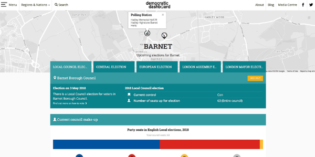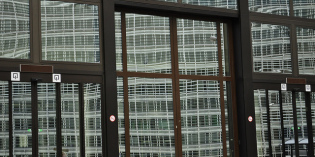Tag: Democracy Online

England’s local elections 2018: bridging the information gap with the Democratic Dashboard
On 3 May, voters across England have the chance to vote in elections to their local councils. The Democratic Dashboard is Democratic Audit’s voter resource, which brings together an array of information on the local elections taking place. Our aim is to simplify the complicated world of local elections in the UK, and present the essential information in an effort to boost participation. The UK has one of the lowest rate of electoral participation by young people in the OECD, especially at local elections, and we hope to play a part in using the digital environment to bridge the information gap, writes Joshua Townsley.

Facebook and Cambridge Analytica: let this be the high-water mark for impunity
The problems we see at social media companies today are the by-product of a laissez-faire approach to regulation, writes MacKenzie F. Common.

Digital technology is changing party politics, the interesting question is how
It is evident from the 2017 general election, writes Kate Dommett, that digital technology has been fully embraced by political parties and incorporated into campaigning strategies. It is also creating opportunities for satellite campaigns to mobilise citizens. Longer term, digital innovations have the potential to reshape the nature of engagement between citizens and parties, though these more fundamental changes are not yet being implemented.

Sinn Féin MP’s resignation demonstrates the dangers of social media for politicians
On 15 January, Barry McElduff, Sinn Féin MP for West Tyrone, resigned after a video he posted on Twitter offended victims and families of the 1976 IRA Kingsmill massacre. Paul Reilly (University of Sheffield) examines what this incident means for politicians who make use of social media in Northern Ireland.

Using technology to inject the demos back into democracy
Possibilities to ‘take action’ and participate in our current system may exist, but they are rarely effective.While individuals may be able to express their opinions, there is no mechanism in place for translating those opinions into action. In this light, Roslyn Fuller writes online deliberation allows us to take a leap towards much deeper democracy. Similar PostsBrexit […]

Governments should consider the consequences when they decide whether to adopt Internet voting
It sometimes seems to be a matter of when, and not if, online and remote voting will become available across advanced democracies. A combination of loyalty to the traditional model of voting that is generally still used, and concerns about privacy and security continue to hold back its wider application – despite successful trials in […]

The baloti.ch project shows the difficulties in engaging the disenfranchised in the political process using e-participation apps
Can a society be peaceful, prosperous, and happy when 25% of the population lack political rights on the national level? Uwe Serdült thinks not, and helped build an app to provide informal voting rights using an e-participation app for use in Swiss referendums. Although the app wasn’t a resounding success, it did provide an opportunity for disenfranchised […]

Online platforms differ in their capacity to affect public opinion and increase public knowledge of the EU
How do European citizens receive what little information that they do about the policies and activities of the European Union? Laura Sudilich shares research which shows that the mainstream media – encompassing print, online, and TV – continue to dominante, despite the greater suitability in some respects of the internet. She shows that only online platforms that host well-vetted […]

Connecting knowledge to power: the future of digital democracy in the UK
Since its invention, the internet has been considered a ‘game-changer’ when it comes to democracy, with a worldwide network providing the potential to create a truly participatory democracy. This has yet to happen, but numerous individuals and groups are beginning to ask what can be done to marry the internet with representative democracy, including the […]



 Democratic Audit's core funding is provided by the Joseph Rowntree Charitable Trust. Additional funding is provided by the London School of Economics.
Democratic Audit's core funding is provided by the Joseph Rowntree Charitable Trust. Additional funding is provided by the London School of Economics.